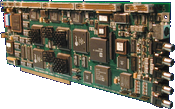Manufacturer NewTek, USA | Date 1994 | Amiga A2000, A3000, A4000 | Interface Zorro II |
- NTSC only non-linear editing system
- broadcast quality, tapeless nonlinear editing system for the Video Toaster and Video Toaster 4000
- requirements:
- Video Toaster with v4.1 software
- a SCSI 2 drive for Lightwave recording
- three SCSI 2 drives for A/B roll editing - two for video, one for audio
- input from video tapes must be time base corrected
- compresses and plays back video in realtime
- true broadcast quality - 60 fields per second, full overscan 752×480
- internally works with D2 data - no D2 / composite transcoding
- proprietary coporession method: Video Toaster Adaptive Statistical Coding (VTASC):
- relies on limiting the video signal (i.e. dropping to Beta SP quality) instead of lowering picture quality as do JPEG, MPEG, WaveLet
- no visible pixelization, artifacts show as video "noise" instead of jpeg "blockiness"
- by using faster drives, lossless D2 quality can be achieved
- three SCSI buses (two for video, one for audio), each bus can handle 7 SCSI drives (21 total)
- two serial ports to control serial-capable VTRs
- the SCSI and serial ports can be routed outside of the computer with the so called Octopus cable
- video:
- video input to the Flyer is provided via the connecting internal ribbon cable from the Toaster, as is video output
- 14.3 MHz sampling rate
- 8 bit quantizing
- 8 MB buffer
- audio recorder / mixer:
- ADSP2115
- digital inputs
- video disk A and B, left and right
- audio disk A and B, left and right
- analog, unbalanced left and right RCA inputs and outputs on the card's backplane
- 64 kB memory
- 20 MHz clock rate
- 16 bit sampling at 44.1 kHz
- 64x oversampling ratio A/D converter
 Amiga Hardware Database
Amiga Hardware Database


